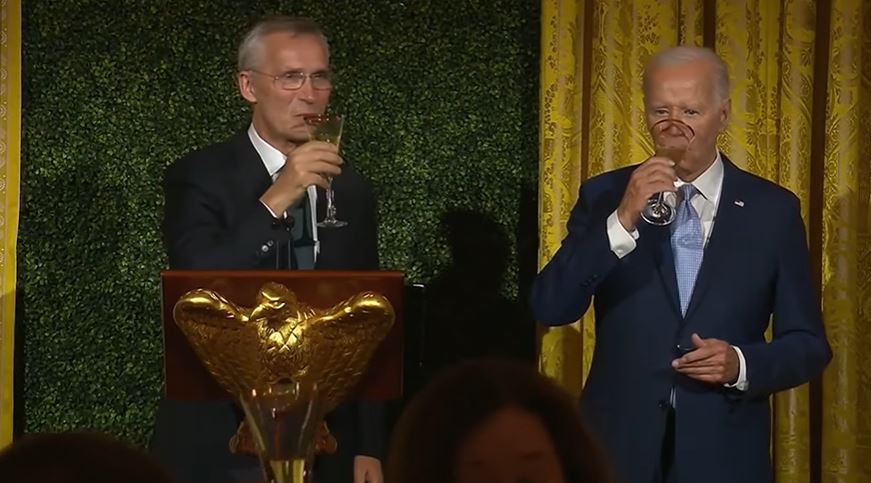China Denounces NATO’s Allegations of Malicious Intent in Russia-Ukraine War
In an assertive response, China has vociferously criticized the draft communiqués emerging from the NATO summit in Washington, which label Beijing as a decisive enabler of Russia’s ongoing war effort in Ukraine. The Chinese government has condemned these assertions as biased and aimed at sowing discord.
NATO’s Allegations and China’s Response
The NATO draft communiqués have pointedly accused China of playing a crucial role in supporting Russia’s military actions in Ukraine. Furthermore, the documents suggest that Beijing poses systemic challenges to European security. Reacting to these allegations, Chinese foreign ministry spokesperson Lin Jin vehemently refuted the claims during a regular press briefing.
“On the Ukraine crisis, NATO hyped up China’s responsibility. It makes no sense and comes with malicious intent,” Lin Jin asserted. He further urged NATO to introspect on the root causes of the crisis and to undertake concrete actions aimed at de-escalation rather than shifting blame onto China.
A Historical Perspective on China’s Stance
China’s position on the Ukraine conflict has consistently emphasized promoting peace talks and political settlements. Over a year ago, Beijing proposed a 12-point paper outlining general principles for ending the war. However, this proposal received a lukewarm reception from both Russia and Ukraine at the time, with critics arguing that it lacked specificity.
The Root Causes of the Conflict
According to Lin Jin, NATO’s statements fail to address the underlying issues fueling the conflict in Ukraine. He contends that the alliance’s approach is marked by a Cold War mentality, characterized by belligerent rhetoric and unfounded accusations. A spokesperson for the Chinese mission to the European Union echoed these sentiments, describing the NATO draft as “full of Cold War mentality and belligerent rhetoric, and China-related content full of provocations, lies, incitement, and smears.”
China’s Diplomatic Efforts and International Recognition
Despite NATO’s criticisms, China maintains that its core position on the Ukraine issue is to foster dialogue and peaceful resolution. This stance, according to Chinese officials, has garnered broad international recognition and appreciation. China’s diplomatic efforts are framed as sincere attempts to mediate and facilitate a peaceful end to the conflict.
Geopolitical Implications and NATO’s Asia-Pacific Expansion
China’s criticism of NATO extends beyond the Ukraine crisis. Beijing has consistently warned against the alliance’s expansion into the Asia-Pacific region, arguing that such moves disrupt the region’s prosperity and stability. The presence of leaders from Japan, South Korea, New Zealand, and Australia at the NATO summit underscores the strengthening ties between these nations and the security alliance, amid rising concerns over China’s assertive actions in the South China Sea.
Analyzing NATO’s Strategy and China’s Reactions
NATO’s strategic posture, particularly its efforts to align more closely with Asia-Pacific countries, is perceived by China as a direct challenge to its regional influence. Beijing views NATO’s expansionist ambitions as a threat to regional stability and a provocation that could exacerbate existing tensions.
Diplomatic Rhetoric and Realpolitik
The exchange of accusations between NATO and China highlights the complex interplay of diplomatic rhetoric and realpolitik. While NATO seeks to consolidate its alliances and counter perceived threats from China, Beijing’s response reflects its determination to safeguard its strategic interests and counter Western narratives.
Future Prospects for Sino-NATO Relations
The ongoing tension between China and NATO raises critical questions about the future trajectory of their relations. As NATO continues to expand its influence and foster alliances in the Asia-Pacific region, China is likely to respond with increased diplomatic and strategic assertiveness. The evolving dynamics between these major geopolitical players will have far-reaching implications for global security and stability.
Conclusion
China’s robust rebuttal of NATO’s accusations regarding its role in the Russia-Ukraine conflict underscores the deepening rift between Beijing and the Western military alliance. As both sides continue to navigate this complex geopolitical landscape, the need for constructive dialogue and mutual understanding becomes ever more pressing. The international community will be closely watching how this confrontation unfolds and its potential impact on global peace and security.
Soumya Smruti Sahoo is a seasoned journalist with extensive experience in both international and Indian news writing. With a sharp analytical mind and a dedication to uncovering the truth, Soumya has built a reputation for delivering in-depth, well-researched articles that provide readers with a clear understanding of complex global and domestic issues. Her work reflects a deep commitment to journalistic integrity, making her a trusted source for accurate and insightful news coverage.



